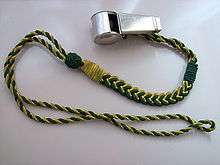lanyard
English

A lanyard (2) with a whistle
Etymology
From Middle English lanyer, from Middle French laniere, from Old French lasniere (“thong, lash”), from lasne (“strap, thong”), metathetic alteration of nasliere, nasle (“strap, thong”), from Frankish *nastila (“tie, headband”), from Proto-Germanic *nastilō (“tie, thread, strap”), from Proto-Indo-European *ned- (“to tie together”). Cognate with Old High German nestila (“band, headband, strap”), Old Norse nesta (“brace, strap, fastener”), German Nestel (“string, strap, lace”).
Noun
lanyard (plural lanyards)
Translations
a short rope used for fastening rigging
|
a cord worn around the neck; used to hold a small object such as a whistle
|
This article is issued from
Wiktionary.
The text is licensed under Creative
Commons - Attribution - Sharealike.
Additional terms may apply for the media files.